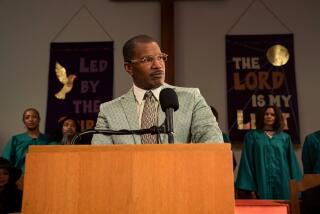MOVIE REVIEW : A Murderous Miscarriage of Justice
- Share via
“Let Him Have It” (selected theaters) does a straightforward, workmanlike job of dramatizing the Craig/Bentley murder case of 1952, one of England’s most infamous.
For Americans, most of whom are unfamiliar with the case, the film will lack the morbid fascination that it no doubt holds for British audiences. But you don’t have to be versed in the particulars of the murder to appreciate the film’s almost biblical sense of fate. The story has a grim inevitability--you can see the pit toward which its characters are heading and yet you don’t want to look away.
Nineteen-year-old Derek Bentley (Chris Eccleston), epileptic and slow-witted, lives at home with his parents and sister. His family alternately prods and coddles him; they would like to see him make something of himself but Derek is inclined to drift along.
It makes him a perfect mark for the local youth gangs that, with their easy access to black-market firearms, proliferated in postwar London. Befriended by 16-year-old Chris Craig (Paul Reynolds), whose older brother is a top crook, Derek dawdles into a life of petty crime.
Chris, who models himself after James Cagney, complete with swagger and larcenous grin, understands Derek’s need to belong to something outside the lower middle-class strictures of his family; he understands Derek’s need to be disreputable.
When the boys attempt to pull off a warehouse robbery, Chris ends up shooting dead a police constable and wounding another. Derek was implicated in the murder for crying out to Chris, “Let him have it!” This plea for the boy to lay down his weapon and surrender was characterized in the subsequent trial, which lasted two days, as an incitement to murder.
Despite a recommendation for mercy from the presiding judge, Derek, after an angry nationwide debate, was executed. (Chris, being too young for capital punishment, survived.)
Peter Medak, who also directed the true-crime drama “The Krays” last year, has a compelling, unfussy style; as in his last film, he hones in on the details of the case and lets the larger meanings emerge unemphatically.
The film (rated R for violence and language) has a cloistered quality; it could have used a bigger budget. Medak and his screenwriters skimp on the tumult the trial caused, the ways in which the case brought out into the open the festering rage of the established order against the lawless lower classes still high from the end of the war. (Even capital punishment advocates came to regard Derek’s sentence as a miscarriage of justice.)
By falling back on a straightforward “psychological” approach, Medak exposes the weaknesses of his method. He doesn’t really get under the skin of his protagonists.
Eccleston plays Derek as such a dim and decent soul that the film seems to be pleading his mercy even before we’ve had a chance to make up our mind about him. Reynolds’ Chris has a baby-faced horror that wears a bit thin.
As Derek’s father, Tom Courtenay gives the film’s best performance. Even before the murder occurs, we can see that his character is a good man racked by the pain his son is causing him. He’s racked because he genuinely loves Derek.
Courtenay slowly works his way into the center of the movie’s sympathies. When he embraces his remaining family at the moment of his son’s execution, his sorrow seems boundless.
‘Let Him Have It’
Chris Eccleston: Derek Bentley
Paul Reynolds: Chris Craig
Tom Courtenay: William Bentley
Tom Bell: Fairfax
A Fine Line Features release. Director Peter Medak. Producers Luc Roeg, Robert Warr. Executive producer Jeremy Thomas. Screenplay Neal Purvis, Robert Wade. Cinematographer Oliver Stapleton. Editor Ray Lovejoy. Costumes Pam Tait. Production design Michael Pickwoad. Art director Henry Harris. Running time: 1 hour, 44 minutes.
MPAA-rated R (violence and language).
More to Read
Only good movies
Get the Indie Focus newsletter, Mark Olsen's weekly guide to the world of cinema.
You may occasionally receive promotional content from the Los Angeles Times.










